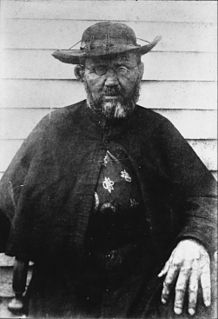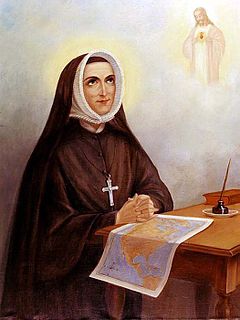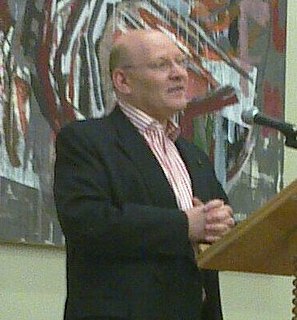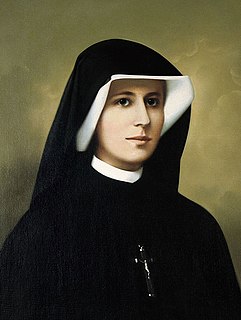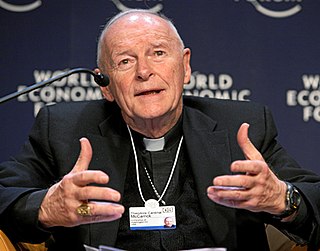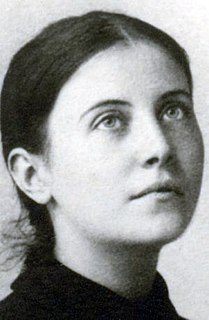Top 165 Eucharist Quotes & Sayings - Page 3
Explore popular Eucharist quotes.
Last updated on April 16, 2025.
You also realize, Venerable Brothers, that the Eucharist is reserved in churches or oratories to serve as the spiritual center of a religious community or a parish community, indeed of the whole Church and the whole of mankind, since it contains, beneath the veil of the species, Christ the invisible Head of the Church, the Redeemer of the world, the center of all hearts, 'by whom all things are and by whom we exist'.
'Lord you know that I love you...Lord, you know that I love you' (Jn 21:15-17). The Eucharist is, in a certain way, the culminating point of this answer. I wish to repeat it together with the whole Church to Him, who manifested His love by means of the Sacrament of His Body and Blood, remaining with us 'to the close of the age'
Since Christ is the only way to the Father, in order to highlight His living and saving presence in the Church and the world, the International Eucharistic Congress will take place in Rome, on the occasion of the Great Jubilee. The Year 2000 will be intensely Eucharistic: in the Sacrament of the Eucharist the Savior, who took flesh in Mary's womb twenty centuries ago, continues to offer Himself to humanity as the source of Divine Life
You know, the act of feeding someone is the ultimate act of care and affection...sharing yourself with someone else through food. He held another mouthful of cake under her nose. Think about it. We are fed in the Eucharist, by our mothers when we are infants, by our parents as children, by friends at dinner parties, by a lover when we feast on one another's bodies...and on occasion, on another's souls.
Virgin Immaculate, perfect lover of Our Lord in the Blessed Sacrament, we ask you to obtain for us the graces we need to become true adorers of our Eucharistic God. Grant us, we beg of you, to know Him better, to love Him more, and to center our lives around the Eucharist, that is, to make our whole life a constant prayer of adoration, thanksgiving, reparation, and petition to Our Lord in the Blessed Sacrament. Amen.
I think what Pope Francis is saying is that nobody's perfect, you know? And so someone like Joe Biden, you know, where - you know, when he was running for president, people were - there were some bishops that were like don't let him have the Eucharist. And Pope Francis is saying that's not the point of this.
The most important truths always appear first as blasphemies or obscenities. That's why every great innovator is persecuted. And the sacraments look obscene, too, to an outsider. The eucharist is just sublimated cannibalism, to the unawakened. When the Pope kisses the feet of the laity, he looks like an old toe-queen to some people. The rites of Pan look like a suburban orgy.
All my sermons are prepared in the presence of the Blessed Sacrament. As recreation is most pleasant and profitable in the sun, so homiletic creativity is best nourished before the Eucharist. The most brilliant ideas come from meeting God face to face. The Holy Spirit that presided at the Incarnation is the best atmosphere for illumination. Pope John Paul II keeps a small desk or writing pad near him whenever he is in the presence of the Blessed Sacrament; and I have done this all my life - I am sure for the same reason he does, because a lover always works better when the beloved is with him.
The thought of the presence of God and the spirit of worship will in all my actions have as their immediate object Jesus, God and man, really present in the most holy Eucharist. The spirit of sacrifice, of humiliation, of scorn for self in the eyes of men, will be illuminated, supported and strengthened by the constant thought of Jesus, humiliated and despised in the Blessed Sacrament
my belief in the sacrament of the Eucharist is simple: without touch, God is a monologue, an idea, a philosophy; he must touch and be touched, the tongue on flesh, and that touch is the result of the monologues, the idea, the philosophies which led to faith; but in the instant of the touch there is no place for thinking, for talking; the silent touch affirms all that, and goes deeper: it affirms the mysteries of love and mortality.
Every call to worship is a call into the Real World.... I encounter such constant and widespread lying about reality each day and meet with such skilled and systematic distortion of the truth that I'm always in danger of losing my grip on reality. The reality, of course, is that God is sovereign and Christ is savior. The reality is that prayer is my mother tongue and the eucharist my basic food. The reality is that baptism, not Myers-Briggs, defines who I am.
Without prolonged moments of adoration, of prayerful encounter with the word, of sincere conversation with the Lord, our work easily becomes meaningless; we lose energy as a result of weariness and difficulties, and our fervor dies out. The Church urgently needs the deep breath of prayer, and to my great joy groups devoted to prayer and intercession, the prayerful reading of God's word and the perpetual adoration of the Eucharist are growing at every level of ecclesial life.
What gets me back to church, I think, is thinking maybe this time that question "Is it true?" will be answered, not just in terms of somebody saying, "Yes, it's true," but something will happen in a sermon or maybe shuffling up to the Eucharist, or in the old lady who's sitting beside me with a Bible - maybe something will happen which will show me that it's true. So I go back thinking, maybe this time I'll be lucky.
Where was Mother Teresa's Jesus? He was in the Bible, in the church, in her prayer, in the Eucharist, in her sisters, in the heart of everyone she met, and especially in the poorest of the poor and the lowest of the low. Jesus was in disguise in each one of them. Jesus was behind the foundation of her order. Jesus was behind all that she did.
[Christ's] mission and work it is to help against sin and death, to justify and bring life. He has placed his help in baptism and the Sacrament [i.e., communion/Eucharist/Lord's supper], and incorporated it in the Word and preaching. To our eyes Baptism [capitalized in original] appears to be nothing more than ordinary water, and the Sacrament of Christ's body and blood simple bread and wine, like other bread and wine, and the sermon, hot air from a man's mouth. But we must not trust what our eyes see.
Her [Mary's] motherhood extends beyond view. In the will of the Son, she becomes at once mother and maid: sheltering him, but sheltered in him, forming him, but formed by him ... When she pronounces the words: 'Be it done to me according to thy word', the Mother conceives the mystery from the Trinity, in order to give it to the Son. The Son gives the word back to the Trinity by giving everything he has back to the Father in the Spirit. Then, after the Father has received it again, it is distributed to mankind by means of that extravagant expansioning-the Eucharist and the Holy Spirit.
Every Mass is a memorial of that one sacrifice and that passover which restored life to the world. Every Mass puts us into intimate communion with her, the mother, whose sacrifice 'becomes present' just as the sacrifice of her Son 'becomes present' at the words of consecration..... At the root of the Eucharist is the virginal and maternal life of Mary
Only through the Eucharist is it possible to live the heroic virtues of Christianity: charity, to the point of forgiving one's enemies; love for those who make us suffer; chastity in every age and situation of life; patience in suffering and when one is shocked by the silence of God in the tragedies of history or of one's own personal existence. You must always be Eucharistic souls in order to be authentic Christians
In early Judaism, the priesthood was maintained within various families and passed down from father to son, thus necessitating marriage. But this is the old covenant, and even within this model priests were required to abstain from having sex with their wives during the time they served in the Temple. Catholics believe that priests fulfill this Temple relationship ever day - the Mass and the Eucharist mean they are serving in the Temple every day of their ordained lives.
Our Lord came to the aid of each great tribulation with a special devotion. The present and future tribulations of the Church and of nations are greater than at any other period, and this persecution is more dangerous than those of previous times. Hence, the devotion which God sends to the succor of His Church and of the nations at the present time is the devotion to the Most Holy Eucharist. It is the highest of all devotions.
A God who draws near out of love, the Holy Father continued, walks with His people, and this walk comes to an unimaginable point. We could never have imagined that the same Lord would become one of us and walk with us, be present with us, present in His Church, present in the Eucharist, present in His Word, present in the poor, He is present, walking with us. And this is closeness: the shepherd close to his flock, close to his sheep, whom he knows, one by one.
I often went to Catholic mass or Eucharist at the Episcopal church, nourished by the symbol and power of this profound feeding ritual. It never occurred to me how odd it was that women, who have presided over the domain of food and feeding for thousands of years, were historically and routinely barred from presiding over it in a spiritual context. And when the priest held out the host and said, "This is my body, given for you," not once did I recognize that it is women in the act of breastfeeding who most truly embody those words and who are also most excluded from ritually saying them.
Every morning during meditation, I prepare myself for the whole day's struggle. Holy Communion assures me that I will win the victory; and so it is. I fear the day when I do not receive Holy Communion. This bread of the Strong gives me all the strength I need to carry on my mission and the courage to do whatever the Lord asks of me. The courage and strength that are in me are not of me, but of Him who lives in me - it is the Eucharist.
The more ardent the love for the Eucharist in the hearts of the Christian people, the more clearly will they recognize the goal of all mission: to bring Christ to others. Not just a theory or a way of life inspired by Christ, but the gift of his very person. Anyone who has not shared the truth of love with his brothers and sisters has not yet given enough.
The Eucharist is the secret of my day. It gives strength and meaning to all my activities of service to the Church and to the whole world. . . . Let Jesus in the Blessed Sacrament speak to your hearts. It is he who is the true answer of life that you seek. He stays here with us: he is God with us. Seek him without tiring, welcome him without reserve, love him without interruption: today, tomorrow, forever.
This practice of adoration is based on strong and solid reasons. For the Eucharist is at once a sacrifice and a sacrament; but it differs from the other sacraments in that it not only produces grace, but contains in a permanent manner the Author of Grace Himself. When, therefore, the Church bids us to adore Christ hidden behind the Eucharistic veils and to pray to Him for spiritual and temporal favors, of which we ever stand in need, she manifests faith in her divine Spouse who is present beneath these veils, she professes her gratitude to Him, and she enjoys the intimacy of His friendship
If it were not for the Eucharist, if it were not for this marvelous manifestation of God's love, if it were not for this opportunity to place ourselves in the very real presence of God, if it were not for the sacrament that reminds us of His love, His suffering and His triumph, which indeed perpetuates for us His saving sacrifice on the cross, I am sure that I could never face the challenges of my life, my own weakness and sinfulness and my own need to reach out to the Living God.
Sometimes I have experienced God in extraordinary ways - in dramatic surprises or soul-expanding insights or unexplainable mystical encounters. More often, I have felt God's reality in the simple encouragement of a friend, in the gentle inspiration of a sermon, or in the familiar ritual of the Eucharist and I'd be less than honest if I didn't also say that at times, I've found myself in the spiritual doldrums, cast adrift, wondering if the wind would ever blow again.
Do grant, oh my God, that when my lips approach Yours to kiss You, I may taste the gall that was given to You; when my shoulders lean against Yours, make me feel Your scourging; when my flesh is united with Yours, in the Holy Eucharist, make me feel Your passion; when my head comes near Yours, make me feel Your thorns; when my heart is close to Yours, make me feel Your spear.
If God really became incarnate, and if His Incarnation can with justice compel man to change his life,then we have no alternative but to conceive of this Incarnation as something which is still present and which will remain present for all future time. ... What happens in the liturgical celebration of the Eucharist is something for which all religions of mankind have exressed longing, dimly sensed was coming, and as a rule even prefigured- the physical presence of the divine Logos made man, and the presence of his sacrificial death, in the midst of the congregation celebrating the mysteries.
This is a real presence which includes every dimension of who Jesus is: body and blood, human soul and divine person. The consecrated Eucharistic species are the Lord and therefore command our adoration. We do not adore ourselves, nor the ordained priest, nor the Bible, even though these are vehicles for Christ's spiritual presence; we do adore the Eucharist, this blessed sacrifice made really present sacramentally.
Mary adored Jesus as the Bridegroom of souls. Union is the final purpose of love. Jesus by the gift of His substance in the Eucharist unites Himself with our souls as with His dear spouses. As a Bridegroom, He gives them all His possessions, His name, His heart, His whole Self, but on the condition that the soul reciprocates. The soul, His spouse, shall live for Him only
O most sacred, most loving heart of Jesus, thou art concealed in the Holy Eucharist, and thou beatest for us still.... Thou art the heart of the Most High made man.... Thy Sacred Heart is the instrument and organ of Thy love. It did beat for us. It yearned for us. It ached for our salvation. It was on fire through zeal, that the glory of God might be manifested in and by us.... In worshipping thee I worship my incarnate God, my Emmanuel
For 2,000 years, the Church has been the cradle in which Mary places Jesus and entrusts Him to the adoration and contemplation of all peoples. May the humility of the Bride cause to shine forth still more brightly the glory and power of the Eucharist, which she celebrates and treasures in her heart. In the sign of the consecrated Bread and Wine, Christ Jesus risen and glorified, the light of the nations, reveals the enduring reality of His Incarnation. He remains living and real in our midst in order to nourish the faithful with His Body and Blood.
The Eucharist is the full realization of the worship which humanity owes to God, and it cannot be compared to any other religious experience.... The risen Lord ... calls the faithful together to give them the light of His Word and the nourishment of His Body as the perennial sacramental wellspring of redemption. The grace flowing from this wellspring renews mankind, life, and history.
And according as we say, "Our Father," because He is The Father of those who understand and believe; so also we call it "our Bread," because Christ is The Bread of those who are in union with His Body. And we ask that this Bread should be given to us daily, that we who are in Christ, and daily receive The Eucharist for the Food of Salvation, may not by the interposition of some heinous sin...be separated from Christ's Body.














